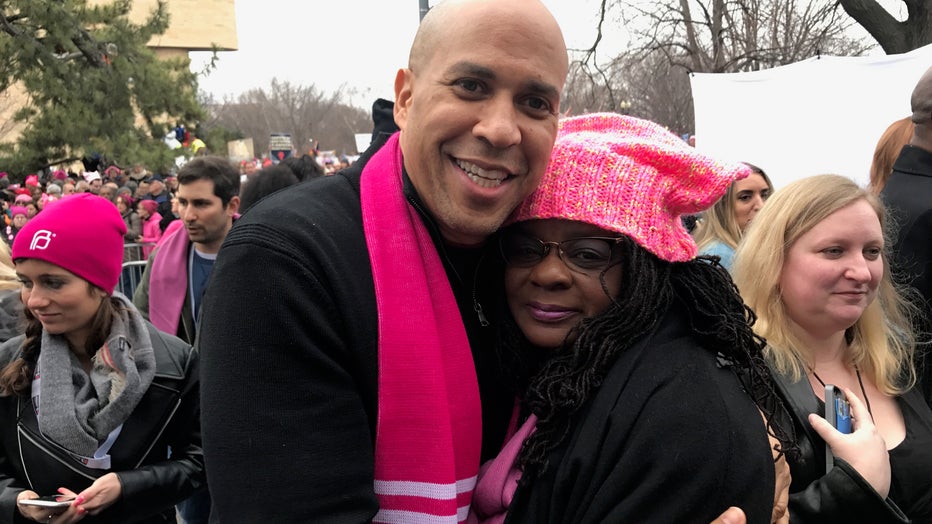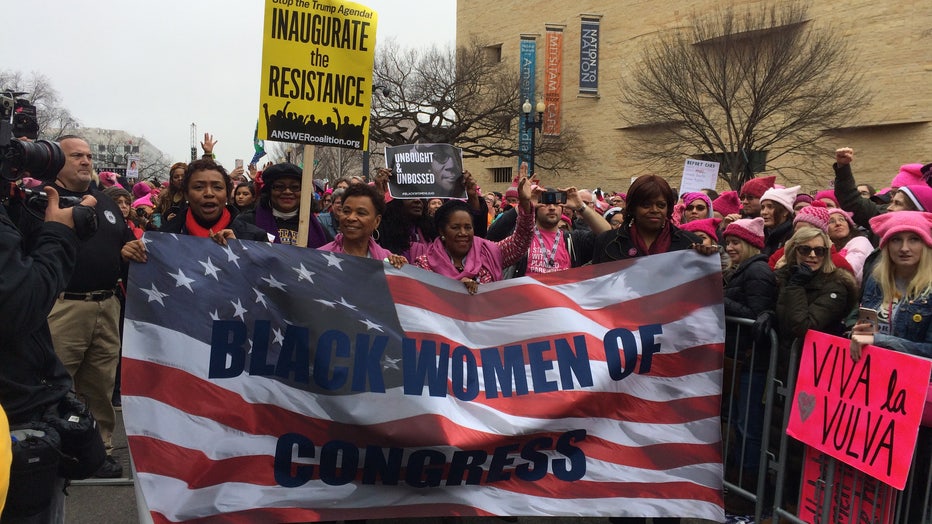Congresswoman Gwen Moore sees unity, not division, at Women’s March

By Megan Carpentier in Washington, D.C.
For Congresswoman Gwendolyn Moore, there’s one moment from Saturday’s rally portion of the Women’s March on Washington that will stand out to her: it was when she was staring at the massive crowd, just after she’d ceding the stage to the Reverend Jesse Jackson and activist and scholar Angela Davis.
"Every time I'm discouraged, I'll remember that moment on stage, that sea of humanity," she said.
Moore, a Wisconsin Democrat who’s represented the state’s 4th District since 2005, was part of a Congressional delegation that stood before that crowd shortly after noon. Newly-elected Senators Kamala Harris of California and Tammy Duckworth of Illinois spoke while Congress members including Moore, Linda Sanchez (California), Barbara Lee (California), Debbie Wasserman Schultz (Florida) and others applauded, waved, and even took pictures of the massive crowds.
But the logistics of getting to that point were difficult for the 65-year-old. The swelling crowds that showed up to march—estimated as high as 500,000—made movement difficult, and the sheer volume of attendees backstage hugging and taking photos made it hard to find or keep a seat. But like many of the older women at the march, Moore didn't intend to allow a little stiffness in her joints hold her back from participating as much as possible. Each round of applause, and every person who asked to shake her hand, seemed to give her even more energy.

Senator Cory Booker poses with Congresswoman Gwen Moore at the Women's March on Washington in Washington, D.C. on January 21, 2017.
"I felt loved, supported, and held and respected," she said of her participation in the march, her hand-knit pink pussy hat slightly askew. "It's helping me regain my sense of balance after this election. This is the country that God created. Thank God."
Around her, staffers in the performers' tent jostled for selfies with gracious stars like Olivia Wilde and America Ferrera as well as Planned Parenthood President Cecile Richards and the aforementioned Harris, who got a rock star's applause to her speech. Journalist and transgender activist Janet Mock was visibly touched by the number of women coming up to tell her how she'd inspired them, and Michael Moore ambled past after his speech with no less than five cameras pointed at him.
The color pink was as ubiquitous backstage as in the crowds, from the pink pussy hats— knit caps with the suggestion of cat ears, a reference to President Donald Trump's infamous leaked Access Hollywood "grab 'em by the *****" comment—to the women's attire to the Planned Parenthood t-shirts and scarves. Performers and guests pointed out the best signs in the crowd to one another for photo opportunities and posed with their own favorites: Moore's was a pre-printed black-and-white sign that said "Unbowed & Unbossed #blackwomenlead."
Moore held it over her head as she went to greet the crowds with a group of fellow black Congresswomen, behind a red-white-and-blue banner which reading "Black Women of Congress." A male staffer in a pink Planned Parenthood t-shirt and knit cap shouted at the crowd to get them hyped: "We've got the Black Women of Congress in the hoooooouse!" he yelled, and the marchers cheered, reaching over the fence to shake hands and hug the women as they went by.
"This doesn't play to their strategy of dividing us," said Moore with a small smile, after hugging a young man who recognized her. Later in her apartment on Capitol Hill, she mused about the day, folding clean towels as two young staffers posted pictures to Snapchat and her Twitter account.
"I'm 65 years old," she said, "And part of me thinks that I could just spend however many years I have left doing something else, something less exhausting."

The "Black Women of Congress" march at the Women's March on Washington in Washington, D.C. on January 21, 2017.
"But it's my dream to defend the poorest women and children," she added. "That's why I'm here. That's why I would stay here."
Laundry folded, she stood up to answer the phone. A staff member was downstairs to give her a ride across town to a Student Nonviolent Coordinating Committee Legacy Project event—a dialogue called "The Multigenerational Resistance of Black Women." Moore hopes to build support for her RISE Out of Poverty Act, a bill designed to overhaul the Temporary Assistance for Needy Families program (better known as welfare) in order to comprehensively address child poverty. It only had two co-sponsors in the last Congress; if Moore wants her ideas taken into account, she'll have to find more.
So off she went, back into the crowds of mostly women in silly pink hats, who spent Saturday promising to participate in resistance to the incoming administration. Moore, and others, are hoping they keep showing up.

